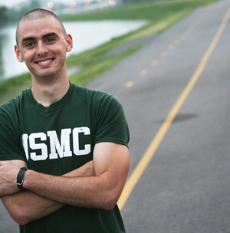His feet will pound the pavement for 100-consecutive miles in 24 hours.
Sunset, sunrise and the scorching heat of the Mississippi day will pass, but Brady Hendrix plans to keep running.
The 2007 University alumnus aims to complete an “ultramarathon” April 25-26 in Natchez, Miss., to benefit Relay for Life’s fundraising efforts.
“Probably the reaction I get the most is, ‘You’re running 100 miles? Can you even do that?'” he said. “They just can’t even wrap their minds around it.”
Hendrix decided to attempt the feat after seeing his aunt Kathleen Black undergo a long struggle with colon cancer. She died April 4, and Hendrix aims to raise $10,000 in her memory. Supporters can visit ultramarathonbrady.com to donate.
“It’s not about me or the run,” Hendrix said. “It’s about being able to raise money and do something about cancer. My four cousins [lost] their mom. How many millions of other people in the world are dealing with that?”
But as much as he dislikes the attention, Hendrix’s feat has piqued considerable interest and raised quite a few eyebrows.
A marathon, considered one of the most grueling athletic events, is 26.2 miles. Hendrix will run the equivalent of 3.8 marathons in less than 24 hours.
Running is nothing new for Hendrix. He took up the sport in 7th grade when his crush joined the track team. He followed and has not stopped running since then.
Hendrix will begin running at 5 p.m. April 25 and aims to finish by 5 p.m. April 26. His goal is to keep a 6 mph pace.
But Hendrix almost sounds like a “Name that Tune” contestant when estimating how quickly he can reach the 100-mile mark.
“I think I can do it in 20,” he said. “Actually, I think I can do it in 18 or 19.”
University history senior Dave Melichar describes his friend Hendrix as having “a weird type of quiet intensity about him.”
Melichar said he was not surprised to hear Hendrix’ lofty 100-mile goal.
“I didn’t even blink,” he said. “I just asked him when.”
A team of five supporters, including Melichar, will follow Hendrix in a “chase car” and on bicycles during the 24-hour period.
“The only thought that needs to be in his mind is ‘Left foot … right foot,'” Melichar said. “There’s always going to be someone with him.”
As an Iron Man competitor, Melichar has his own extreme sporting experience. He said he will use his knowledge to help Hendrix regulate nutritional intake.
The primary concern is to keep Hendrix sufficiently hydrated and fueled. Melichar estimates Hendrix will burn 600 calories per hour.
To stay hydrated, he will drink PediaSure and water. Every 30 minutes Hendrix will stop for about two minutes to quickly consume high-calorie foods.
On his list of favorites: peanuts, salt-covered baked potatoes, potato chips, bananas and peanut butter and jelly sandwiches.
The goal, Melichar said, is to avoid “the bonk,” or severe fatigue from a lack of carbohydrates.
“Your body will start absorbing fat and muscle, and you’ll run out of gas,” Melichar said. “Some people start feeling sleepy. Your legs go out, and your knees buckle. When your body goes so fast like that, the mind quits too, and there’s no fuel to keep it going.”
In addition to nutritional advice, Hendrix’s team will need to keep his morale high.
Hendrix plans to pass most of the time listening to his iPod. His favorite musical selections include movie soundtracks such as “300,” “Rocky III” and “Batman.”
But when he’s not jamming to “Eye of the Tiger,” Hendrix will chat with his support crew, including 17-year-old brother Paul Hendrix.
Paul Hendrix said his aunt’s recent death has given the race new meaning.
“It was already pretty intense and surreal,” Paul Hendrix said. “Now he wants to get this done so bad because of the huge emotional investment he has in it.”
After completing his 100-mile feat, Hendrix will lean on the experience when he enters basic training camp for the U.S. Marine Corps.
His philosophy: Pain is primarily a mental block.
“At a certain point, you can’t hurt anymore,” Hendrix said. “It will cycle between feeling terrible and wanting to stop a million times and then feeling like you can sprint a six-minute mile. Between miles 50 and 75 will be the hardest. But by mile 80, it’s all downhill.”
—-Contact Amy Brittain at abrittain@lsureveille.com
Alumnus aims to run 100 miles in 24 hours (4/15)
April 16, 2008

Hendrix rests after training. He is hoping to help raise money for cancer research.



